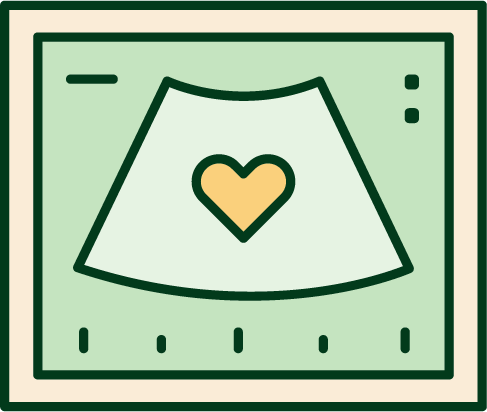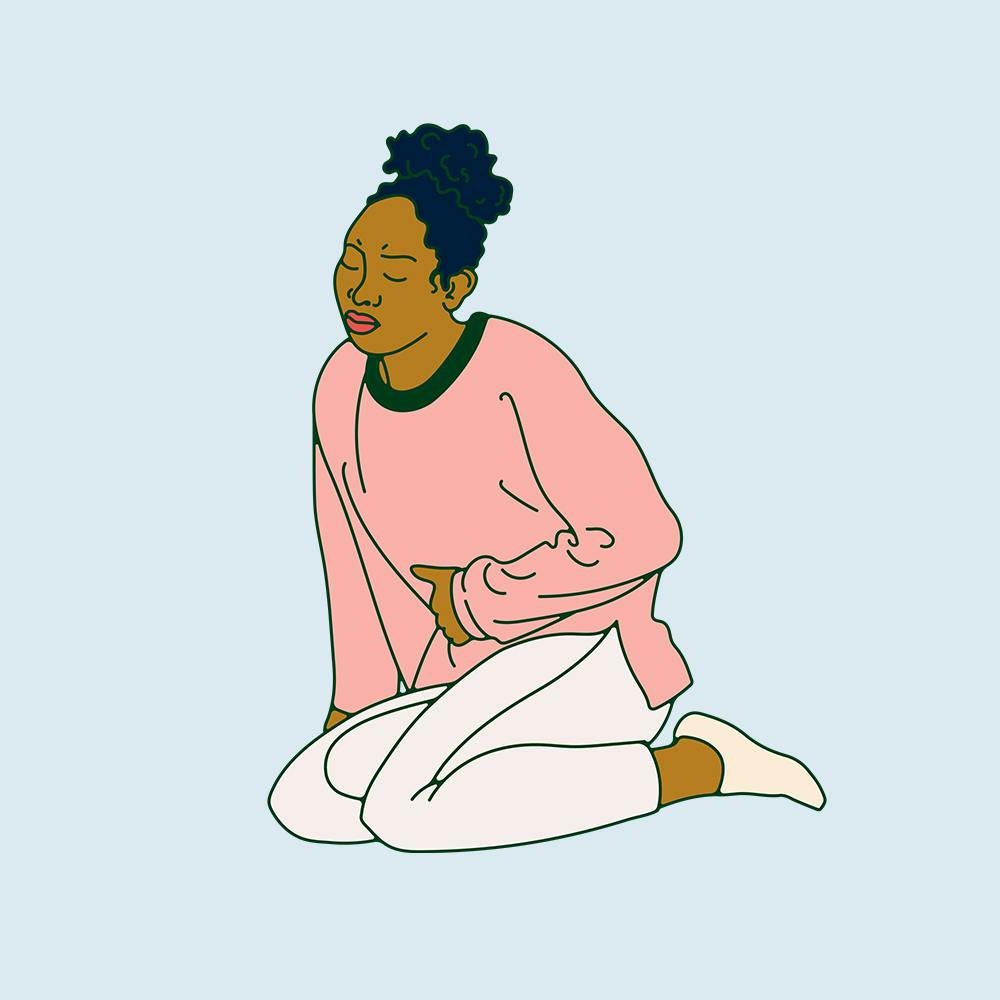Table of contents
1. The narrative that pregnancy should be one of the happiest times in your life may be a dangerous one, research suggests. Long and wide prevailing tropes about the joys of pregnancy have created shame and stigma for expectant people suffering with their mental health – and potentially consumed by thoughts of suicide.
2. The hormonal impact of pregnancy
3. Stress during pregnancy
4. Environmental factors
Illustrated by Sabrina Bezerra
The narrative that pregnancy should be one of the happiest times in your life may be a dangerous one, research suggests. Long and wide prevailing tropes about the joys of pregnancy have created shame and stigma for expectant people suffering with their mental health – and potentially consumed by thoughts of suicide.
Studies have shown that pregnancy and postpartum are high risk times for depression and suicidal feelings.
While suicide completion during pregnancy is rare, it’s among the leading causes of death for those who’ve recently given birth. A new study that analysed data from 2006 to 2017 in the US has even suggested that suicide ‘near misses’, suicidal ideation, and self harm during pregnancy are on the rise for cis women.
The same study found the escalation in this type of behaviour was more rapid for Black and low income pregnant women. Those with anxiety and depressive disorders also had higher escalations of suicidal thoughts and behaviour during the time period studied.
Types of suicidality
Not all suicidal thoughts mean you intend to end your own life in reality. Thoughts and feelings of suicide are typically put into two or three groups, suicidal ideation, suicidal intent, and suicidal completion.
All of these can be deeply unpleasant. Though, when you’re experiencing suicidal ideation, distressing (or not) thoughts of hopelessness and daydreams about the different ways you might end your life remain just that. Suicidal intent involves making tangible plans to actually end your life beyond this.
“With ideation, we feel hopeless and trapped, so we expend ourselves with thoughts of suicide to cope and temporarily reduce anxiety,” explains psychotherapist Michael Padraig-Acton.
“We feel we are taking control of the situation by fantasising about ending it all. Suicidal ideation differs from suicidal intent because you don’t actually put plans in place to approach the next step.”
The next step being suicidal completion, when a suicide attempt has been successful. Padraig-Acton stresses that commonly held beliefs that “carrying a potential life inside you” and preparing for “the gift of being a mother” make suicidal thoughts and feelings less likely, or impossible, are false.
“Suicidal completion during pregnancy is rare, though on the other hand, suicidal ideation during pregnancy is not rare at all,” he says.
“Clinically, when someone begins planning and researching how to actively end their lives, that is the red flag moment. If we are just dealing with ideation, that is considered low risk clinically.”
While the risk of suicidal completion is lower than in the general population for pregnant women, suicidal ideation is relatively common among all racial and income groups.
The hormonal impact of pregnancy

Oestrogen levels rise rapidly during the first trimester, and then steadily throughout the rest of pregnancy. A study of 417 women in England found 9.8% of them felt depressed during pregnancy.
For women that previously did not meet the criteria for major depressive disorder, there’s a marked increase in self reported depressive symptoms during pregnancy – known as antenatal depression – for these women.
Fatigue, sleep disturbances and changes in appetite are common during pregnancy, but these are also all markers of depression. Despite the cause, these symptoms can lay the groundwork for suicidal feelings.
“Even if the environment around you is sound, once testosterone and oestrogen start flying around the body and brain during pregnancy, that can cause depression and consequent suicidal ideation,” says Padraig-Acton.
There’s less research into antenatal depression and suicidality than there is for postpartum depression. This means the prevalence of suicidal feelings during pregnancy might be higher than current statistics show.
Key drivers throughout pregnancy, both oestrogen and progesterone are steroid hormones that come from cholesterol. Even as these hormones rise and fall during a normal menstrual cycle where conception doesn’t occur, both these hormones can influence mood.
For a pregnant person, these effects are significantly heightened as hormone levels and fluctuations become more dramatic.
The oestrogen receptor was discovered in the early 60s and set the production of a steroid hormone roadmap in motion. This roadmap documented the behaviour of steroid hormones and its effects on the body. Research that springboards off these findings suggests that some women are more sensitive to pregnancy hormones and hormone fluctuations in general, making them particularly susceptible to anxious, depressive and suicidal feelings while pregnant.
Stress during pregnancy
As well as the first trimester, oestrogen also spikes during the third trimester. At this time, progesterone levels are also high.
This increase in oestrogen and progesterone also partly trigger a rise in cortisol, a key stress response hormone. Cortisol can trigger our flight or fight response and leave us in a prolonged state of anxiousness if it remains at high levels.
The Hypothalamic-Pituitary-Adrenal (HPA) Axis consists of the hypothalamus, located in the brain, the pituitary gland, located at the base of the brain, and the adrenal glands, located just above your kidneys. Together, they all work together to regulate stress response, sleep cycles and trigger certain points in the menstrual cycle by secreting key hormones. T
he HPA axis can become overstimulated during pregnancy, as hormones fluctuate. This can lead to spikes in stress hormones and trouble sleeping. Being in a constant state of stress, along with sleep deprivation, are both risk factors for suicidal ideation.
“With all the rapid fluctuations in hormones that happen during pregnancy, it can leave people feeling not themselves,” says Padraig-Acton.
“When you combine this with stressful environmental factors that might surround a pregnancy, the hormones and outside influences can make suicidal feelings more likely. But that’s not to say these feelings can’t develop just from hormonal or environmental factors alone.”
He contrasts the raging hormones experienced over a nine month period against hormonal shots given to people undergoing MtF gender transition. Oestrogen shots can cause mood swings, depression, suicidal ideation and symptoms like extreme crying that can persist for about 30 days.
“That’s just one oestrogen injection that can temporarily cause all those symptoms,” he says. “Now imagine what can happen to a pregnant person who’s experiencing high levels of oestrogen, and other hormones, consistently over many months.”
Environmental factors

Lack of support, an unwanted pregnancy, previous mental health issues and relationship problems can all put a strain on the emotional health of a pregnant person.
Pregnancy doesn’t magically erase all the negative feelings that can stem from these outside factors. While hormonal fluctuations can exacerbate the stress caused by interpersonal issues and existing mental health problems, even those who have coped well with the hormonal impacts can be adversely affected.
One study based in Chicago found the risk of suicidal ideation to be twice as high when pregnant among low income women, with one in 20 participants experiencing suicidal thoughts.
The study also notes that medication used to treat mental health conditions prior to pregnancy is often stopped during pregnancy to protect the foetus, as there’s a high risk of any medication taken by an expectant person passing through the placenta. How these drugs might affect a foetal development isn’t always known, leaving some unwilling to take the risk at all.
Another Baltimore study of 168 single, low-income pregnant women found their experience of suicidal ideation to be at 23%.
Intimate partner violence and experience of abuse in childhood have both been studied in relation to suicidal ideation, too. Women that had experienced either of these were at significantly greater risk of suicidal ideation during pregnancy.
Pregnant cis women with depression who had also experienced childhood abuse were 20 times more likely to experience suicidal ideation.
Combined, the existing research suggests that current or previous trauma is a severe risk factor for suicidal ideation during pregnancy. There’s even less research into active suicidal behaviour in pregnant women, though one study highlights that Black women are at greater risk for antenatal suicide attempts, as well as those marginalised in other ways.
These include women that have previously been hospitalised for psychiatric illnesses, women struggling with drug abuse or addiction, lack of health insurance, and teenage mothers.
Even when pregnancy isn’t a factor, Black women have worse mental health outcomes across the board. They are more likely to enter the mental health system through more aggressive means, like being arrested by the police and sectioned.
Structural racism and a lack of cultural understanding that underpins their social interactions, their experiences of healthcare, and their opportunities make suicidal ideation and other mental health issues significantly more likely.
Existing injury to the vagina, previous pregnancy complications, or other gynaecological conditions were also noted as heightening suicidal ideation risk.
Religious beliefs, societal stigma or family pressure might leave some pregnant people in a situation where they feel they have no choice but to continue a pregnancy they don’t want. The Turnaway Study found high levels of stress, hopelessness, suicidal thoughts, generalised anxiety, depression and PTSD are seen among women under these circumstances.
“Perhaps the worst part about experiencing depression during pregnancy is that there is an expectation of elated happiness from everyone around you,” says Padraig-Acton.
“It can be particularly difficult when you feel you’re not coping or feeling positive, but everyone around you is reacting with excitement over your pregnancy. This can lead to extreme isolation where suicidal thoughts can grow uninterrupted."
For more information and support with maternal mental health, click here.






